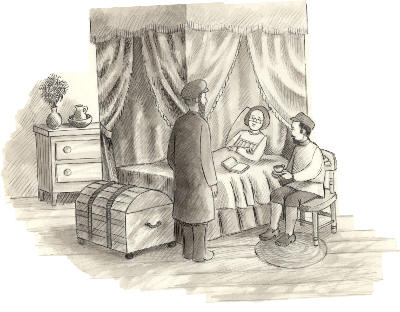Tipping The ScalesFrom A Chassid's Journey and Other Breslover Tales
Retold For Children and Illustrated by Dovid Sears
For hundreds of years, no one was allowed to own land in Eastern Europe unless he was a Christian. Therefore, all Jewish farmers and innkeepers had to rent their property from wealthy Christian noblemen. And woe to the Jew who didn't earn enough money to pay his rent! The landlord could take away everything he owned and lock him in prison until the poor man's family and friends paid his debt.
In a village near Zlatipolia there lived a Jew who worked as rent-collector for the local landlord. All the innkeepers for miles around would bring their rent to this man, and he would deliver the money to the landlord.
This rent-collector was not very generous. But his wife was modest and kindhearted. She especially felt sorry for the Jewish innkeepers. Whenever one of them didn't have enough money to pay his rent, she would secretly give him whatever he needed from her own savings.
One day, the rent-collector's wife became sick ( so sick, in fact, that everyone was afraid she would die. Her husband called the best doctors, but they couldn't help at all. The innkeepers were particularly upset. Since the woman had always been good to them, they wanted to help her in any way possible. But they also were worried about their future: without this kind woman, who would help them when they needed money? They began to search far and wide for a doctor who could cure her.
One of these innkeepers was a follower of Rebbe Nachman, who at that time lived in Zlatipolia. While everyone else was looking for doctors, this Chassid told the Jewish rent-collector about the Breslover Rebbe. "Send him a pidyon nefesh [i]," he urged. "He has helped people in even worse troubles. I'm sure he can help you, too!"
"I'll try anything!" the worried husband agreed. "But my wife is so sick that I'm afraid to leave her. Please do us a great favor: take our pidyon nefesh to your Rebbe while I wait here with my wife."
The Chassid hurried to Zlatipolia and soon stood at Rebbe Nachman's door. Upon being admitted, he presented the pidyon nefesh with the sick woman's name and that of her mother. The Rebbe gazed thoughtfully at the slip of paper. Then he asked the Chassid for a gold coin called a "rendel." The man took one out of his money pouch and gave it to the Rebbe.
Rebbe Nachman put the coin on a little scale, and saw that the weight of this rendel was slightly less than it was supposed to be. "I must have a rendel which has its true value," the Rebbe said.
Again, the Chassid handed the Rebbe a gold coin. But it, too, proved to be less than its proper weight.
"I'm sorry," said Rebbe Nachman. "I must have a different rendel."
This time the Chassid emptied the entire contents of his money pouch onto the table. Rebbe Nachman himself picked a gold coin, which turned out to be just the right weight.
"Now you may go home," he told his Chassid. "The woman already feels better!"
The man was astounded by the Rebbe's words. He looked at his pocket-watch and saw that there still was enough time to get back to his village before dark. Soon he would know the fate of the sick woman.
Upon his arrival, the Chassid was greeted by the rent-collector. With a tired but smiling face, he ushered his guest into his house. Sure enough, the rent-coIlector's wife was sitting up in bed, looking cheerful and well.
"Not long after you left," the husband explained, "my wife's breathing became weaker and weaker, until it completely stopped. We thought she had died, Heaven forbid. So everyone began to weep and cry out in grief. Suddenly, my wife's eyelids began to flutter. Her breathing returned to normal, and, a few minutes later, she opened her eyes. She asked for a drink of water, and then told us something amazing!"

The rent-collector turned to his wife, who finished the story herself. "When my soul left my body, I found myself standing in front of the Heavenly Court. My sins and good deeds were being weighed against each other on a hanging scale. Unfortunately, the bad side was just a bit heavier than the good. The Court announced that I must die, and I began to shake with fear. But just then a young man ran into the Courtroom and tossed a rendel onto the scales, tipping the balance in my favor. The next thing I knew, I was back in my own home and feeling much better, Boruch Hashem!"
"What time was this?" the Chassid asked his host.
And what do you think the rent-collector answered? It was the very minute that Rebbe Nachman had put the last gold coin on his little scale in Zlatipolia!
© 1990 Mesorah Publications
[i] A pidyon nefesh (literally, "redemption of a soul") denotes the heavenly intercession of a tzadddik through prayer on behalf of another person. It is customary to give charity in connection with a pidyon nefesh in order to confer special benefit upon the individual in need. Kabbalistic works deal extensively with this procedure, the model for which is the intercession of Moses on behalf of Israel after the sin of the Golden Calf. Another parallel is the prayer of the Kohen Gadol (High Priest) in the Holy Temple on Yom Kippur.
|

